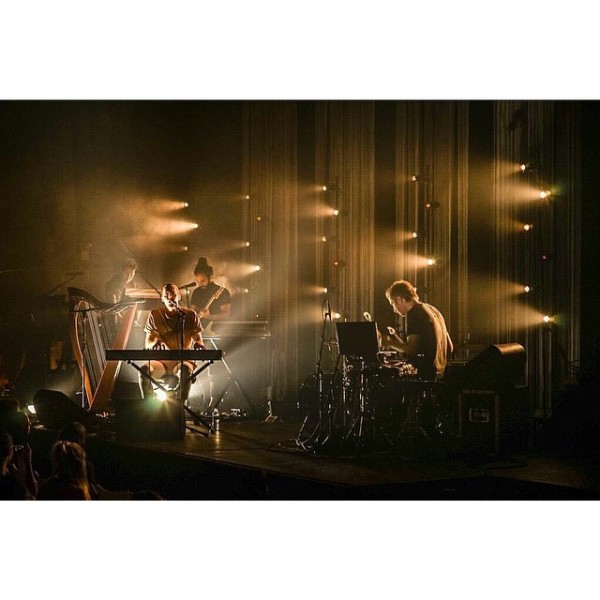KQED Arts chatted with Grossi about his work.
What kind of popular music were you listening to while you were in the Philadelphia Boys Choir?
I was nine years old when I joined the choir. I didn’t have a real grasp of what I liked musically. I just listened to whatever was on the radio: Whitney Houston, Sade, the Eurythmics, Peter Gabriel; the things that my Dad was playing: Fleetwood Mac; and the classics—the Beatles, the Stones, James Brown, a lot of soul music, Marvin Gaye. It was that, combined with this more classical world, that really changed the way I sang in a lot of ways. I think the choir sculpted my voice, and unknowingly I developed this more classical, more operatic style of singing.
So how do you imagine your fans listening to your music—on headphones in their room, on the dance floor, at a meditation retreat?
I have different images. One thing that’s interesting about being out on the road, I get to see the demographic for the shows. And for my shows, it’s a very diverse group. It’s cool to see how the music touches different people in different places. I picture most people using it like a personal moment. Some music is designed for clubs or for parties. In my mind, my music is for more private moments of reflection and relaxing.
And then you get into a club with a dance floor. Your music isn’t rock and roll. How do audiences respond?
It depends on the city, the day of the week, how many drinks people have had. I see a lot of couples holding each other, holding hands, embracing. You see people making out. I see girls just crying in front of me, bawling their eyes out. You see people dancing. I think our shows live. It’s a different sort of live experience, it’s more emotional, a little more of an introspective experience, instead of a more extroverted — you know, “I’m going to go to the club to dance and hoot and holler.”
You play harp and keyboards in concert. How is it that the harp is your favorite instrument, when it’s so rarely featured in pop music?
Everyone is generally dazzled by the whole thing. And I guess I’ve always naively looked at it as just another way of making sound, and adding texture and dynamics to a song. I never really sat and thought I want to have this look, and it’s going to create a certain persona, style or genre I’m blending. It was really just me blindly grabbing at instruments that I found nearby as I was writing music and becoming more interested in songwriting and recording. The harp just fell into my world. I sort of obsessed over how it added texture to a song. It also gave me that classical sense as well, which I yearned for in a lot of ways.
You have a new album out called Mercy. What song captures the essence of the album and this tour?
I think the last song on the album, “Too Late,” is not necessarily a radio song, but it encapsulates the mood of the album in a lot of ways. It feels like the rawest and most relevant track to me currently.
What’s that song about? Who is it written to?
That song is almost a letter to my girlfriend. Almost a year ago, we split up and went through a tough period together. That song came out of that period of searching for some answers, as a way of crawling my way back to her and pleading and trying to find that love again in my life.
But the song seems to be anticipating that it may be, as the song says, “too late.”
That may be. But I think the song ends with a more optimistic note. I finish with the words, “now I know” — I’ve sorted through my emotions and I know now that she’s the one.
And are you together?
Yes we’re together now.
Congratulations. The pleading worked. You mentioned in an interview a few years ago, that you’re very superstitious. Have there been any good omens for the success of this tour?
There have been lots of great signs. There was a girl who came to one of the shows. And she had been to one of my very first shows. She had purchased this limited edition cassette that I put out really early on. I’d written her this note saying, “keep trusting yourself. And keep being creative,” because she was a musician herself and she’d been looking for inspiration. She came back to me on this tour with the tape in hand. She had a tape of her own music and gave it to me. So that felt like a good omen that she came back. It came full circle in a way.


